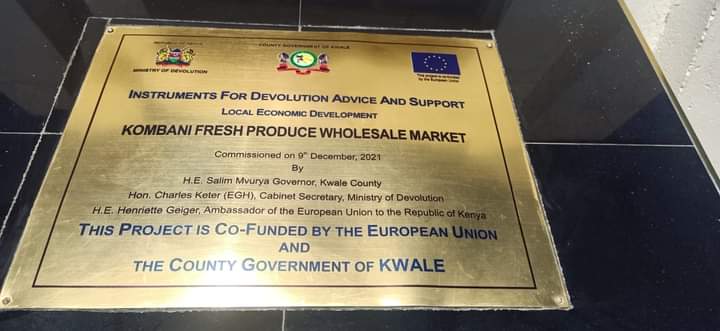By Shaban Omar
The Kwale County government has denied allegations of misusing public funds, which critics claim have led to stalled projects.
Recently there has been a public uproar following a video content created by one of the social media influencers, who accused the county of squandering millions on projects that have remained incomplete for years.
The projects cited include the Sh120 million Kombani Fresh Produce Wholesale Market, the Sh149 million Official Governor’s Residence, and the Sh600 million Shimba Hills Fruit Processing Plant.
Kwale County’s Director of Communication, Nicky Gitonga, dismissed the allegations in a statement, labeling them unfounded propaganda.
“It has come to our attention that misleading information about various Kwale County projects is circulating online. The information is malicious and a strategy opponents use to taint county government,” he said.
Gitonga said that the construction of the Kombani Market was completed and officially commissioned on November 21, 2021, with traders allocated their respective operating spaces.
However, he noted that a court order filed by a contractor has since prevented the county from opening the facility, and the case remains pending, limiting the governor’s ability to intervene.
He said due to the court order, the county has been unable to access the facility or provide security, resulting in massive damage from vandalism.
The contractor sued the Kwale County government over the alleged violation of contract terms and payment, accusing the county of unlawfully subcontracting the project to another party.
The contractor said they were seeking Sh44 million in arrears from a total of Sh106 million they used for constructing the market.
In response, the county claimed it paid everything and it terminated the contractor’s work due to accusations of substandard workmanship and abandoning the site midway through the project, allegations that the contractor also denied.
On October 10, 2022, Kwale Governor Fatuma Achani attempted to reopen the Kombani Market.
During the event, violence erupted when goons attacked 22 private security guards employed by the contractor to prevent county officials from entering the market. At least 16 people were injured in the clash.
On October 13, 2022, the contractor moved to the High Court in Mombasa, seeking further orders to bar the Kwale government from conducting operations at the market.

In a ruling on October 25, Mombasa High Court ordered, “For the avoidance of doubt, there shall be no opening, no launching, and no entry into the premises of the market in issue by the respondents or anyone acting on their instructions.”
On December 2, 2022, the Kwale County government moved to appeal, seeking an order from the Court of Appeal to overturn the High Court’s ruling but to no avail.
The judgment was scheduled for December 8, 2023, but the matter has since dragged on in court. The judgment has been deferred several times.
The Kombani Fresh Produce Wholesale Market was co-funded by the European Union (EU) and the Kwale County Government. Its construction was officially launched in 2019 by the former Devolution CS Eugene Wamalwa.
The modern market was supposed to be the second largest in the coastal region after the Kongowea market in Mombasa serving more than 6000 local farmers, over 1,000 traders, and 75 wholesalers.
The market, which is strategically located, was expected to be in full operation by December 2021 to ease market access for local traders and fresh produce sellers.
Gitonga further explained that construction of the official governor’s residence began in 2017 with an approved budget of Sh 149 million.
However, in 2020, the Salaries and Remuneration Commission capped spending on governor residences at Sh45 million while the project was still underway.
He noted that the county government petitioned the Senate to address this situation and outline the project’s progress, which ultimately led to its stalling.
Gitonga added that a year later, the Senate allowed the county government to continue with the construction of the governor’s residence.
However, he said that the project has stalled because the county typically undertakes large projects in phases due to limited funding.
“It should be noted that the county usually implements projects in phases due to resource constraints and does not allocate the full budget in a single financial year for major projects. As a result, a project may require up to three financial years to complete,” he said.
The Director of Communication confirmed that the Shimba Hills processing plant in Kubo South is currently in its third phase.
The phase includes civil works such as the construction of a disposal shed, bulk store, and water treatment plant, as well as the installation of cabro paving on the driveway.
Gitonga stressed that the county has so far spent Sh206,357,282 million on the construction of the fruit processing plant, not Sh600 million as claimed by critics.
Gitonga said that Achani’s administration remains transparent and open to scrutiny, urging civil society organizations to be objective in their watchdog role over the government.


